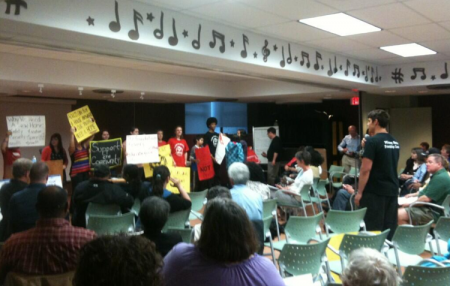Last night’s city-run St. Pat’s-Alexandra consultation yielded more than just ideas for the future of the former school property. Residents gave HRM an earful about development in the rapidly-changing Gottingen Street area, and asked whether they could trust staff and council to listen.
HRM acquired the school from the province in 2011 and deemed it surplus that summer. When HRM attempted to sell the school to JONO Developments, three non-profit groups took the municipality to court, claiming the selection process was unfair.
The three groups won, and the Supreme Court of Nova Scotia ordered the city to re-do the process, adhering precisely to a procedure council passed in 2000.
Last night, staff told a crowd of about 150 people they would publish a request for proposals for St. Pat’s-A in mid-July.
For the last six months the three non-profit groups have asked for input from neighbourhood residents in order to help craft their proposal. Last night was the city’s first, and so far only, chance to hear directly from the community about the future of St. Pat’s-A.
Young people in the Mi’kmaq Native Friendship Centre’s Kitpu Youth Program (which, full disclosure, I’m involved with once a month) came prepared with signs. “Youth are our future,” one read. Another said: “How do condos help youth to grow?” And: “Adults can buy a house anywhere. We need a home.”
The young people demanded an end to high-income residential developments, namely condos, and asked the city to give the Friendship Centre the former school building so they could expand programming.
Another neighbourhood youth group Hope Blooms, run by the North End Community Health Centre, handed staff lists of ideas for the former school property brainstormed at previous community consultations: A place for seniors to hang out, a shelter for homeless people, space for rap battles, talent shows, music programs and cultural programs. And a hot tub.
Lack of trust in city, process
As the meeting progressed, speakers asked whether they could trust the city or the process staff and council are using to dispose of St. Pat’s-A.
“Is the process going to be transparent?” a female speaker asked. “People think they can step on us because we don’t have money.”
Another woman said her neighbourhood has had bad experiences with condos and demanded the city not build them on the St. Pat’s-A property. “I hope the city is not scared of how positive that building can be,” she said of the school.
“I hope you are truly listening to the children,” neighbourhood resident Wanda Lewis said, adding she wanted to make sure staff would actually take the words of the residents to council. “Do what the people are asking.”
Several neighbourhood residents said their lack of trust stemmed from the city’s unilateral decision in the 1960s to demolish Africville and relocate its residents to Uniacke Square, which sits across the street from the school.
HRM obligated to follow 2000 process
City staff outlined the process they are legally bound to follow in the coming months.
According to the 2000 procedure, last night’s consultation was optional. Staff said they viewed the meeting as a chance to start over. They said the information gathered would be given to council.
Once staff calls for proposals from non-profit groups in mid-July, the groups will be given 90 days to apply. Staff will then evaluate proposals based on the following criteria: content compliance, viability, compensation and benefit to municipality.
Council will not be bound by the staff evaluation. Two-thirds of council will need to vote in favour of a proposal in order for it to pass. If council votes against giving the property to a non-profit group, for-profit groups will have a chance to bid on it.
Groups raise concerns about procedure, criteria
In response to the staff presentation, leaders of two community groups raised concerns about the process and evaluation criteria.
Reverend Rhonda Britton of the Cornwallis Street Baptist Church said she was disappointed the city was only committed to holding one consultative meeting, and that there should be a back-and-forth conversation between the city and the community groups. She asked for a follow-up meeting.
The reverend also asked whether the process would be open, and whether the community groups would be able to take part in the decision.
The groups need more details in order to write a proposal, Britton said. Some aspects of the city’s request were “very subjective” and “wishy-washy,” she said.
Jane Moloney of the North End Community Health Centre also criticized staff’s criteria. The “benefit to municipality” was the “most contentious and least clear” item on the list, she said.
Staff also didn’t provide a definition of “market sale” in the presentation, she said. (This definition was a major sticking point during the court case.)
“At the end of the day, council will decide on that benefit,” HRM staff member Bruce Fisher said in response to her question of benefit to the municipality.
In response to Britton’s concerns, Fisher said the city is legally obligated to follow the original 2000 procedure for the disposal of surplus schools. He said he would find out whether it would be possible to hold more meetings.
The city doesn’t have much wiggle room in this case. The groups may be asking for more involvement in the decision-making, but the court ruling compels HRM to follow the 2000 procedure, which states that staff will evaluate the proposals and council will make the final decision.
Meeting a ‘humbling’ experience: Watts
“It’s been a very humbling experience,” area councillor Jennifer Watts told the crowd as the meeting ended.
Watts said the community communicated clearly and publicly that they wanted a stake in the process. “It was good to have that articulated, for staff, for council.”
“I think there are very valid concerns. [Residents gave] a challenge back to HRM about what will be the process, how will it be heard, will it be heard in an effective way. This is not just a come out and we’ll listen and then go on and do our own thing,” she said.
“The fact that it’s been over three hours of thoughtful, passionate but very thoughtful, respectful comments, discussions and questions says a tremendous amount.”




